 A powerful pen laid to rest
A powerful pen laid to rest
Katie Funk Wiebe
1924–2016
Katie Funk Wiebe wrote, “It takes courage to grow old, to be brave enough to accept a flawed world with its excessive violence, unrest and loss of a moral compass, yet cling to ideals and hang onto an inner core of beliefs and values. It is important to hang onto faith, to trust and not be afraid.”
In Wichita, Kan., Oct. 23, 2016, she passed on at the age of 92, leaving a legacy of faith, story-telling and an invitation to live by choice, not by default.
In addition to being an author, biographer, editor, columnist and essayist, Katie was a speaker, preacher, pioneer, prophet, provocateur, feminist, teacher, mentor and historian. In 2000, The Mennonite named her among the top 20 Mennonites with “the most powerful influence on life and belief of the…Mennonite Church in the 20th century.”
Katie’s memory is cherished by her daughter Joanna Wiebe and husband Tim Baer; her daughter Susan Wiebe; son James Wiebe and wife Kathy Wiebe; her seven grandchildren Bill Smith (Dana BuhlSmith), Dave Monterroso (Jennie McKibben Monterroso), Zach Baer, Matt Harms (Louise Cottingham Harms), Christiana Harms (Abe Regier), Jamie Wiebe and Jennifer Wiebe; her five great-grandchildren Ella and Miles Monterroso McKibben, Zola BuhlSmith, Andrew and Maisie Harms; her sister Susan Funk Kruger and husband Harold; and other relatives, friends, students and readers. She was preceded in death by her husband Walter William Wiebe (1962) and daughter Christine Wiebe (2000), her sisters Frieda Funk Schroeder (2013) and Anne Funk Kruger (2009), and her brother Jack Funk (2010).
Katie was born Sept. 15, 1924, in Laird, Sask., to German-Russian Mennonite immigrant parents from Ukraine. She grew up in Blaine Lake, Sask., and attended Laird Mennonite Brethren (MB) Church. She remembered the Depression years when her father owned the grocery store and helped some survive through his generosity; the grasshopper scourges and droughts. During Temperance, their neighbour sold bootleg whiskey Saturday nights. Katie saw King George VI and Queen Elizabeth at close range at the University of Saskatchewan in Saskatoon, during their Royal Tour of Canada in 1939.
As a teenager, she wore broad-brimmed hats and a blue velvet beanie with a waving feather, thought the plain name her immigrant parents had given her didn’t match her dreams and called herself “Kay.”
Her parents’ love of storytelling helped her learn its significance in value formation, but their plans for better educational opportunities for their children did not include writing. “Writing?” Katie wrote later. “No one wrote for a living.” She enrolled in Saskatoon Technical Institute and worked as a legal stenographer in Saskatoon. A chance reading of Oswald Chambers’ book My Utmost for His Highest gave direction to her “happy-go-lucky” life. The book’s devotional for Saturday, September 1, 1944, “Destined to be Holy” “called forth faith on my part to believe that God wanted something of me.”
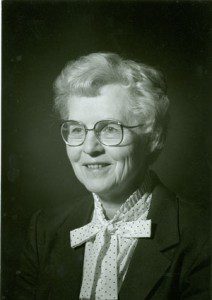 While camping in Prince Albert National Park on Aug. 6, 1945, she heard the news of the bombing of Hiroshima. That year she was baptized in Saskatoon, and was recruited to come to study at the Mennonite Brethren Bible College in Winnipeg by the new president of the college, J.B. Toews, who also wanted her to be his personal secretary. She met Walter Wiebe while working together on a school publication, and they were married August 21, 1947 in Saskatoon Mennonite Brethren Church.
While camping in Prince Albert National Park on Aug. 6, 1945, she heard the news of the bombing of Hiroshima. That year she was baptized in Saskatoon, and was recruited to come to study at the Mennonite Brethren Bible College in Winnipeg by the new president of the college, J.B. Toews, who also wanted her to be his personal secretary. She met Walter Wiebe while working together on a school publication, and they were married August 21, 1947 in Saskatoon Mennonite Brethren Church.
Katie and Walter soon discerned a calling toward a ministry of Christian journalism, which manifested itself in a series of moves, and through their work in various publications. Although religious journalism was dominated by men, Katie began to publish articles in The Canadian Mennonite and Christian Living. In 1961, while Walter completed his Master’s degree in Religious Journalism at Syracuse University in New York state, Katie worked in offices in Kitchener, Ont., to support their four children: Joanna, Susan, Christine, and James.
In 1962, she began a column, “Women in the Church” for The Christian Leader, a Mennonite Brethren publication. The name later became “Viewpoint” when Katie persuaded her editors that she had something to say to both women and men.
The family moved to Hillsboro, Kan., in September 1962, where Walter was to work at the Mennonite Brethren Publishing House. Katie had a part-time job at the General Conference Board of Missions. Weeks later, on November 17, 1962, having been ill for five years with a slowly progressive disease, Walter died.
She was no longer “Mrs. Rev. Walter Wiebe” and early widowhood had pushed Katie into the workforce. While a copy editor and proofreader at the Mennonite Brethren Publishing House, she continued to write freelance articles. In 1966, she became an English instructor at Tabor College. In 1968 she graduated with a Bachelor of Arts from Tabor. She earned a Master of Arts degree in 1972 from Wichita State University, and Tabor promoted her to Associate Professor in 1981.
By 1970, Katie Funk Wiebe was actively calling for a Mennonite Brethren study conference on “the position of women in the church.” Her first widely-read book was published in 1976; the autobiographical narrative Alone: A Search for Joy. She wrote stories of other Mennonite women, “women who were often overlooked because they were not part of the official historical accounts.”
 She became involved in many levels of leadership in her denomination: as board member of the Center for Mennonite Brethren Studies in Hillsboro since 1976, on the Mennonite Central Committee Taskforce for Women in the Church and Society, and on the editorial board of Direction. She was a member of the Peace Section of the Mennonite Central Committee since 1975, and in the 1990s was on the Peace Education Commission of the General Conference of Mennonite Brethren Churches.
She became involved in many levels of leadership in her denomination: as board member of the Center for Mennonite Brethren Studies in Hillsboro since 1976, on the Mennonite Central Committee Taskforce for Women in the Church and Society, and on the editorial board of Direction. She was a member of the Peace Section of the Mennonite Central Committee since 1975, and in the 1990s was on the Peace Education Commission of the General Conference of Mennonite Brethren Churches.
She served on the General Conference Mennonite Brethren Board of Christian Literature from 1975, and as literature coordinator. From 1975 to 1978 she participated in the Women in Ministry Task Force of the MB General Conference Board of Reference and Counsel. In 1978, she was on the publicity committee for the Tenth Assembly of the Mennonite World Conference in Wichita.
She was a member of the Inter-Mennonite Women in Ministry Program. She was interim editor of the Christian Leader in 1995. From 2001–2005 she was editor of Rejoice!, the inter-Mennonite devotional guide. She spoke at retreats, seminars and workshops across the US and Canada, in Mennonite, General Conference Mennonite and Mennonite Brethren groups, as well as cultural and civic organizations.
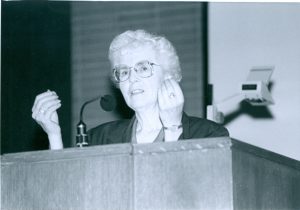
Katie Funk Wiebe speaks at a General MB Conference convention in Winnipeg 1990. MAID photo NP149-1-8662
In 1990, after 24 years, Katie retired from Tabor College as Professor Emeritus. She wrote her last column in The Christian Leader in 1991 after a 30-year run. That year, she also moved to Wichita, paring down her library, her most precious possession. She was eager, in her retirement, to serve the wider constituency of the church she loved deeply; to bring meaning to her life through writing and speaking of her own experience of aging and the role of older adults in the church, and of women’s issues. She began teaching memoir writing at The Shepherd Center, which became LifeVentures, a nondenominational nationwide organization that provides learning opportunities for older adults, where she also was a board member for about 12 years. She led workshops on aging and attended older adult retreats, continued to write and do editorial work, and traveled on behalf of the Mennonite Central Committee. In her lifetime, she visited India, Bangladesh, Nepal, the former Soviet Union, Europe and Central America. In 2011, she began writing a popular blog, Second Thoughts.
In 2013, Katie set up the Katie Funk Wiebe Fund with the Historical Commission of the U.S. and Canadian Mennonite Brethren Churches to promote research and publication on the history and contributions of Mennonite Brethren women around the world. She joined Women4Women Knitting4Peace, and knitted many Peace Pal dolls and children’s hats for relief. She participated in a book club, gave a workshop in memoir writing at the Kansas Author’s Club 2013 annual convention, and enjoyed time with her family.
She has written more than 2,000 articles, columns and book reviews, and has written or edited more than two dozen books. Bless Me Too, My Father won a Silver Angel award in 1989. Another, Border Crossing: A Spiritual Journey, received a Silver Angel Honorable Mention. Life After Fifty is now available in large print edition for the visually impaired. The Storekeeper’s Daughter: A Memoir is the story of her growing up in Saskatchewan, Canada, as the daughter of German-Russian immigrants. Other books on aging include Bridging the Generations and Prayers of an Omega. In 2014, she published A Strong Frailty: Aganeta Janzen Block, Heroine of the faith in the former Soviet Union, the story of her mother’s sister Neta, who survived 11 years in a forced labour camp. In 2015, Katie published My Emigrant Father: Jacob J. Funk, 1896–1986. That year, she also translated Terror, Faith and Relief: The Famine in Russia (Die hungersnot in Russland und Unsere Reise um die Welt), 1924, by D. M. Hofer, American relief administrator in Russia during World War I. Her final book was a revised edition of How to Write Your Personal and Family History: If you don’t do it, who will?, for 2017 release.
The Mennonite Health Association honored her with the Anabaptist Healthcare Award in 1993 for her ministries in mental health, women’s issues and aging. In 2000, The Mennonite chose her as one of 20 Mennonites having had “the most powerful influence on life and belief of the General Conference Mennonite Church and Mennonite Church in the 20th century by raising the credibility of Mennonite writing and giving voice to widowhood and women’s concerns.” In 2000, the Tabor College Alumni Association gave her the Alumni Merit award for the year. An event honoring Katie’s life and work in 2010 at Tabor College featured the release of a “Festschrift” book, The Voice of a Writer: Honoring the Life of Katie Funk Wiebe, published by the Mennonite Brethren Historical Commission. The book reflects on Katie’s contribution to the thought and life of the Mennonite Brethren and the larger Mennonite/Anabaptist community. It also includes a comprehensive bibliography of her writings and presentations. When she received the 2014 Leslie K. Tarr Career Achievement award from the Word Guild of Canada, she was described as “an agent of transformation; a life force that has pushed its way through the firmly packed soil of tradition.”
Katie has been a member of the Mennonite Brethren Church in Saskatoon, the Winnipeg North End Church, Hepburn Mennonite Brethren Church, Kitchener Mennonite Brethren Church, Parkview Mennonite Brethren Church in Hillsboro, Kan., and at the time of her passing, she was a member of First Mennonite Brethren Church in Wichita. In her later years, the Lorraine Avenue Mennonite Church in Wichita was her church home. She taught adult Bible studies for more than five decades.
Katie was questing, curious, perseverant, loyal, invitational, loving, brave, true, a great story-teller and teacher, and always learning and growing. Jean Janzen, Mennonite poet, observes, “Her patient, skillful telling lives because of the fire in her soul – a passion to seek the truth and to record that journey.”
A viewing will be held 5-7 p.m. Oct. 28; a memorial service will be held Jan. 20, 2017, both at Lorraine Avenue Mennonite Church, 655 S. Lorraine St. Wichita, Kan.
Donations can be made to:
- Katie Funk Wiebe Research Fund, c/o Mennonite Brethren Historical Commission, 1310 Taylor Ave., Winnipeg, MB, Canada R3M 3Z6
- Center for Mennonite Brethren Studies, Tabor College, 400 South Jefferson, Hillsboro, KS 67063
- Mennonite Central Committee.
—prepared by the Wiebe family
Selected recent writing in MB Herald:
“My coming out as a geezer-ess”
“Beginning a marriage, beginning a dream”
“Dreamcake and starshine”
“Faith is a journey, not just a beginning”
“A pig for a pig”
Share: How did Katie Funk Wiebe’s writing impact your life?
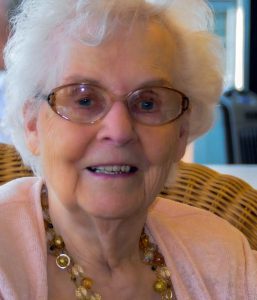
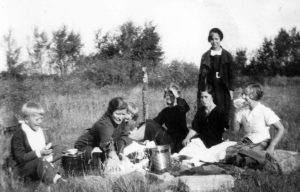
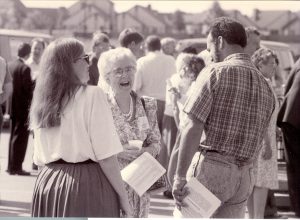
8 comments
I was introduced to Katie Funk Wiebe by a friend. I never had the chance to meet her in person or speak with her on the phone, yet her life touched mine in an out of the way yet indelible sense. When we met I was the Pastor of the Blaine Lake Gospel Chapel, in the same small Northern Saskatchewan town where Katie grew up. My friend, a much closer acquaintance of Katie’s, revealed to me that I shared this space with Katie, and also that the grocery store in town, still operating today, was run for many years by her father Jacob Funk as described in her book “My Emigrant Father.” My friend excitedly took a photo of the grocery store, which stands faithfully on Main street, and e-mailed Katie to confirm. Yes. That was the store, now painted blue. Still run by an emigrant family, this time from Korea instead of Russia.
While writing the history of the church I then pastored, an essay of Katie’s honestly described one of the more difficult periods in our church’s history. For many years the Russian Baptists and the Mennonite Brethren cooperated in the town, until misunderstandings and old divisions sprang up, and there was division. She honestly and graciously described the tensions in the community. Just as honestly and graciously as she wrote about the joys experienced there as well. It was her dad, after all, that helped move the church building from the country to the town, where it still stands, in what would have been the backyard of her childhood home.
On many a Sunday I found myself staring out the window of the fellowship hall of the church into the now empty lot that was the Funk residence, picturing this emigrant family finding their way in the same space I was now finding my way many years later.
I remember reading in “The Shopkeepers Daughter” about the hours she would spend playing by the train tracks across the street from the church, and I would look out the manse window and see the neighbourhood children still playing by those tracks. The tracks themselves are no longer in operation, and have been removed. But the children are still there, almost each day, finding new adventures.
It is a gift to be given your place by those who have gone before. So much of our life we are taught and believe that we must take. We must earn our rightful keep. We must struggle for our place. In the few moments I found myself sharing in the space Katie formerly walked, I found myself grateful to have been given insight into the place I lived. Struggle she did, no doubt, for her place as a female voice in a world where male voices rang loud. And yet, at least for me, she created space. Space to think about small towns in big ways. Space to think about my little ideas with expansive creativity. And space to consider, particularly in moments of grief, that God himself would use my small faith to accomplish grand purposes in His world.
Katie, you will be dearly missed. Thank you for sharing your life with us, so that we can learn from you how to properly share our lives with others. Thanks for your writing, so that we may continue to learn from you despite your passing. Thank you for creating space for us, so that we may walk freely in the places you struggled, with the faith that we share.
Pastor Kevin Koop
Crestwood MB Church
Medicine Hat, AB
As a young adult college student, I read Katie Funk Wiebe’s “Bless Me Too, My Father” and it profoundly impacted my understanding and view of myself as a woman in the life of the church. I am grateful for her voice and the voices of other women leaders that came before me, opening doing and minds for my voice to be a part of the church today.
I was only three, living in Hillsboro for a year with my family, in the year that Katie’s husband died. I do not remember meeting her in person. But through her words, oh yes! Her presence in the MB Herald reassured me, as a young woman, that maybe the voice of a woman could be heard, even among the brethren. Years later, her generosity through the Katie Funk Wiebe Research Grant covered two years of research expenses as my MB pastor-girl-cousin Christine Kampen and I (now a professor in Biblical Studies) researched and wrote our “Daughters in the House of Jacob.” What a joy it was to “converse” with the books of Katie in our own writing. Illuminating our journey and the journeys of our ancestral parents were her thoughts on migrations and immigrants, on being single, on becoming old, on elders and youngers and how do we talk to each other? Her “My Emigrant Father” is already a loved contribution to our shared Mennonite migration story. We will miss you, Katie.
Joanna, thank you for doing such an excellent job with the obituary and overview of your mother’s life and influence in the Mennonite world. Katie was my beloved Sunday school teacher at Parkview MB Church in Hillsboro, KS where she inspired us, asked the hard questions of our faith and helped us find understanding and direction for our lives.
I was blessed by being in touch with Katie for many years until in recent years we became friends as we both aged and tried to learn how to age gracefully in an ever-changing
world.
Thank you, Lord, for the blessings of Katie’s life.
margot, what a flood of memories your brief post triggers in my mind. in 1964 I was brought to Hillsboro by your late husband, Dwight, and worked at the conference office with him 2.5 years, often associating with Katie at the publishing house. then I followed the invitation of my neighbor, Wesley prieb, to teach english comp on a part-time basis at tabor. in a sense, when I left in jan., 1997 she took over and made a career of teaching English there many many years. that doesn’t even begin to tell what a major impact her writings had on my life, esp. in very recent years.
sorry, that date obviously should be 1967 not 97
Katie Funk Wiebe was known to me through occasional correspondence and brief meeting. Mainly, however, I knew her, as did many thousands, through her amazing ability to interest a wide range of readers through her personal strength, prophetic vision and superb writing skills. Katie’s keen awareness and ability to recall intimate details of her life and the lives of others reflected remarkable genius. There are plenty of “doctors of philosophy”; this woman was a full-fledged Philosopher! I for one, as a peripheral Mennonite, am privileged to have read some of her books and flattered to have been included on her e-mail list.
During my first year at Tabor, my second year as a college student since I transferred to Tabor to play soccer, I signed up for my requisite English 101 course. A write a passage. Something to do. To get it out of the way.
When I turned in my first paper, your Mom returned it to me. She told me that it wasn’t good enough to grade yet. I returned to my dorm room confused and upset, but I worked hard and I proudly returned the second draft to her a few days later. She told me the the same thing: it wasn’t good enough to grade yet. Now thoroughly confused, I struggled to find errors in my paper while assuming everything in my paper was flawed. This time I languidly returned my “third draft” — who had heard of such a thing? A few days later she returned the paper to me. A big C, in red letters, or least that’s what my memory has reconstructed, was stamped on my paper and I felt as if I had been branded a “C,” average.
Of course life moved forward and just earlier this year I completed my PhD at the University of Arizona with many adventures in between.
Whenever I teach, I try to use the same technique your mother used with me because the experience taught me that writing is re-writing and doing something well means committing to a process.
Best,
Zachary S. Brooks, PhD (Tabor 1992)